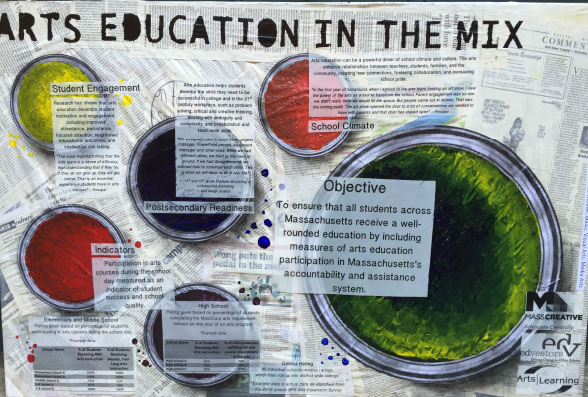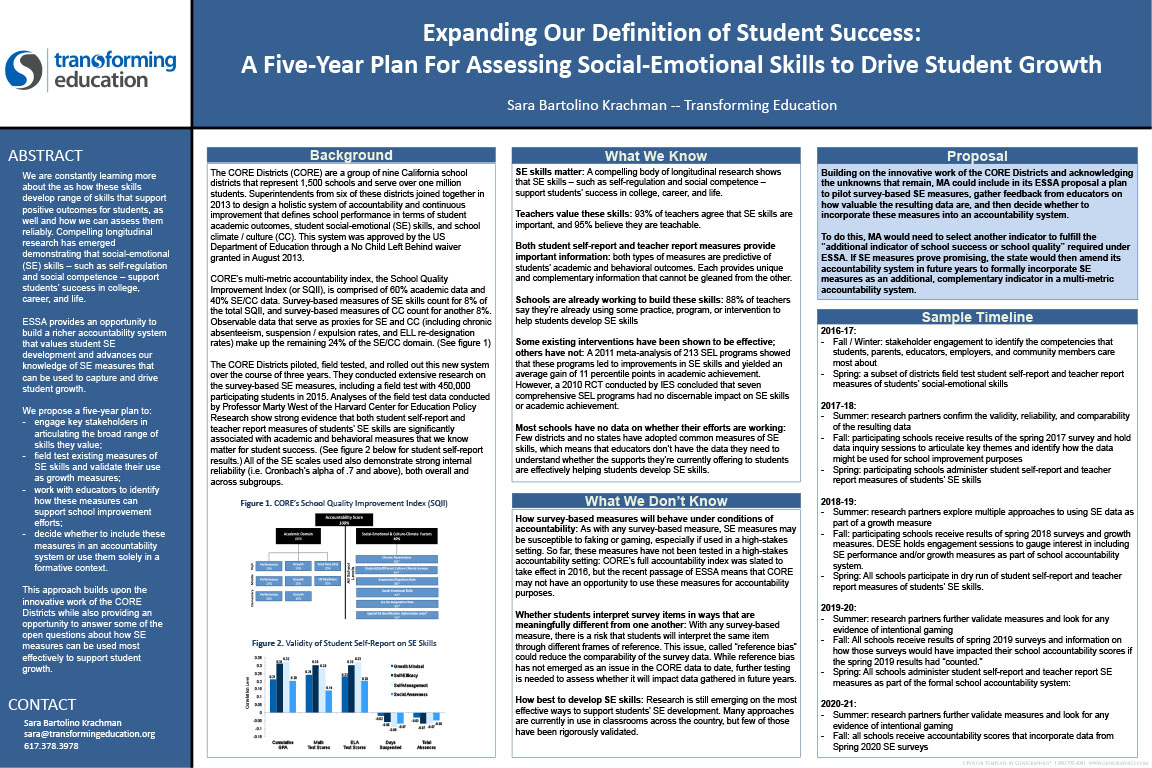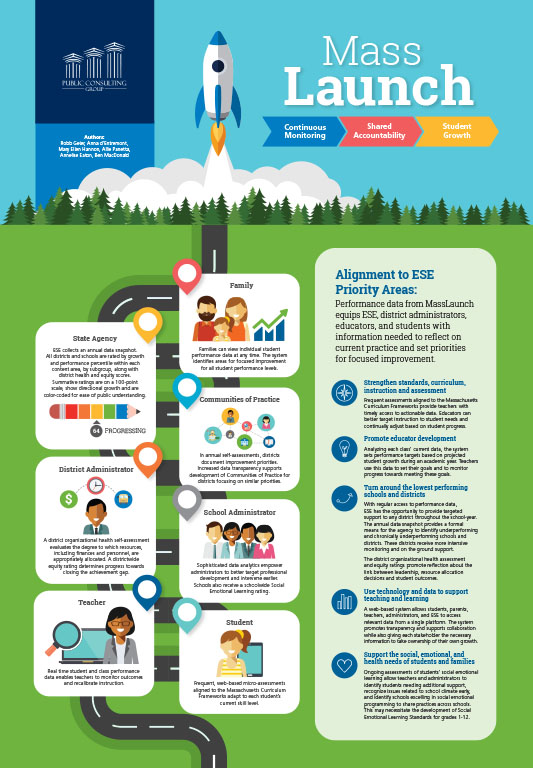Changes in federal law under the Every Student Succeeds Act (ESSA) have provided states the opportunity to reconsider the design of their systems for school and district accountability and assistance. Massachusetts is reflecting on its current design and planning for potential changes to be implemented in the 2017-2018 school year.
To encourage innovative thinking about the future of accountability and assistance, we asked organizations and individuals to create posters outlining new ideas. Nine organizations representing students, parents, educators, and community-based organizations showcased their proposals on posters at a July 21 event, sharing their ideas with state education leaders including Elementary and Secondary Education Commissioner Mitchell Chester.
 ARTS EDUCATION IN THE MIX
ARTS EDUCATION IN THE MIX
Authors: Myran Parker-Brass, Boston Public Schools, Jonathan Rappaport, Arts|Learning, Marinell Rousmaniere, Edvestors, Matthew Wilson, MASS-Creative
Summary: Arts education affords many benefits to students and schools, including increased student engagement, improved school climate, and access to post-secondary readiness skills. Yet, disparities in access exist along socioeconomic and racial lines. The new definition of a well-rounded education in ESSA enables Massachusetts to ensure equity and address this opportunity gap. By including arts education in its accountability system as a measure of student and school success, Massachusetts will be at the forefront of reprioritizing arts education as essential for all, ensuring all students in the Commonwealth have the opportunity to reach their full potential in school, work, and life.
 EXPANDING OUR DEFINITION OF STUDENT SUCCESS
EXPANDING OUR DEFINITION OF STUDENT SUCCESS
Authors: Sara Bartolino Krachman, Transforming Education
Summary: Compelling longitudinal research has demonstrated that social-emotional skills support students’ success in college, career, and life. ESSA provides an opportunity to build a richer accountability system that values student social-emotional development. We propose a five-year plan to:
- engage key stakeholders in articulating the broad range of skills they value;
- field test existing measures of SE skills and validate their use as growth measures;
- work with educators to identify how these measures can support school improvement efforts;
- decide whether to include these measures in an accountability system or use them solely in a formative context.
 MASSLAUNCH:
MASSLAUNCH:
Continuous Monitoring | Shared Accountability | Student Growth
Authors: Robb Geier, Anna d’Entremont, Allie Panetta, Annelise Eaton, and Ben MacDonald of Public Consulting Group
Summary: MassLaunch moves away from a yearly assessment to an ongoing process designed to support instruction and improvement at all levels. Students participate in frequent computerized micro-assessments in ELA, math, and social-emotional learning. Results populate into an online platform accessible to students, parents, and educators. Data transparency supports educators in appropriate goal setting and allows students to monitor their own learning. District staff participate in an organizational health and equity self-assessment, which supports reflection on the impact of resource allocation decisions on student learning. Assessment results feed into an updated ESE rating system that provides a nuanced understanding of performance.
OPENING THE GATES OF POSSIBILITY
Authors: Dr. Susan F. Lusi, President & CEO, Mass Insight Education
Summary: In Massachusetts, too many schools are in danger of failing due to a scarcity of vital supports. Currently, only schools designated Level 4 or 5 are eligible to make changes and access resources for dramatic transformation. However, almost half of Level 3 schools perform as poorly as Level 4 and 5 schools— 43% of Level 3 schools are in the bottom tenth percentile and many have not shown substantial improvement. Without access to the same resources and flexibilities, Level 3 schools are on a trajectory to fail their students. MIE envisions a system where chronically underperforming schools are given the flexibilities and supports they need for sustained improvement before failing, disrupting the pipeline to chronic underperformance and allowing all students to have access to a high-quality education.
A PROGRESSIVE SYSTEM FOR MEASURING SCHOOL
QUALITY AND STUDENT LEARNING
Authors: Massachusetts Consortium for Innovative Educational Assessment (The consortium is practitioner-driven; the governing board is comprised of the superintendents and AFT/MTA teacher union presidents from Attleboro, Boston, Bourne, Framingham, Lowell, Ludlow, Revere, Somerville, and Winchester)
Summary: MCIEA believes there are richer means of assessing student and school progress than established practices—proposing a move away from one, high-stakes standardized test towards a more robust system of multiple measures of student engagement, student achievement, and school quality. MCIEA’s vision of accountability allows students to demonstrate what they know and can do through curriculum-embedded, standards-based performance assessments, measuring deeper mastery of content and skills and preparing a diversity of students for college, career, and life. By placing equity side-by-side with excellence, MCIEA seeks to increase achievement for all students and close prevailing achievement gaps among subgroups.
SCHOOL TURNAROUND PROPOSAL
Authors: Teach Plus Teaching Policy Fellows: Nathan Lewallen, Gina Desir, Krista Fincke, David Jones, Telia Kapteyn, Molly Ross, Will Schwartz
Summary: Students benefit most from interventions that are tailored to their own unique strengths and growth areas. Specific feedback and continuity in support are important components in achieving mastery. We do not wait for students to fail before intervening. Schools also benefit from tailored interventions. We feel that gathering information about multiple indicators of school effectiveness via surveys gives a well rounded picture of a school. We propose that all stakeholders are provided with specific feedback garnered from multiple tools, resources for coaching and implementing best practices, and continuity in the methods that are used to support them.
SHAPING THE FUTURE OF ACCOUNTABILITY IN MA
Authors: STAND for Children
Summary: Stand for Children Massachusetts’ vision for school and district accountability begins with the goal of ensuring every student graduates high school ready to succeed in college and/or career. The path to this goal rests on six pillars: the use of multiple indicators of school and district achievement; a strong curriculum; a focus on teacher quality; an emphasis on increasing proficiency, the use of data (consistent for all schools including elementary, middle school and high school); and maintaining a fair system for school and district ratings. Based on this accountability system, the state would continue targeted assistance to struggling school districts.
TOWARD A CYCLE OF CONTINUOUS IMPROVEMENT
Authors: Trevor Yates and Renee Perdue, Cambridge Education
Summary: Achievement for ALL requires systems and individuals to adopt a cycle of continuous improvement. Beginning with a Collaborative Diagnostic Review, schools participate in guided reflective processes tied to focused planning of intentional actions thus developing a Culture for Learning. Rigorous progress monitoring systems reinforce the expectation of continually collecting evidence of impact so that teams can purposefully determine what to maintain, improve or change. The DNA of increased achievement for all requires synergy amongst state, district and school systems maintaining a focus on developing people, building effective leadership teams, promoting practice excellence and engaging students/families/school communities in a culture for learning.
VISION FOR ASSESSMENTS OF STUDENTS SUCCESS
Authors: Boston Student Advisory Council & Youth on Board
Summary: The Boston Student Advisory Council (BSAC) and Youth
on Board believe every Massachusetts student deserves access to a high quality education and that students should be engaged as real partners in the development of public education standards and state assessments. To measure the quality of their education, students need varied assessments that take their differences into consideration - going beyond typical standardized tests. Assessments should not be used punitively, but instead be avenues towards mutually agreed upon goals for improvement. We suggest DESE look at new assessment models and indicators, including school climate and safety, portfolios and projects, and 21st century/SEL skills.
